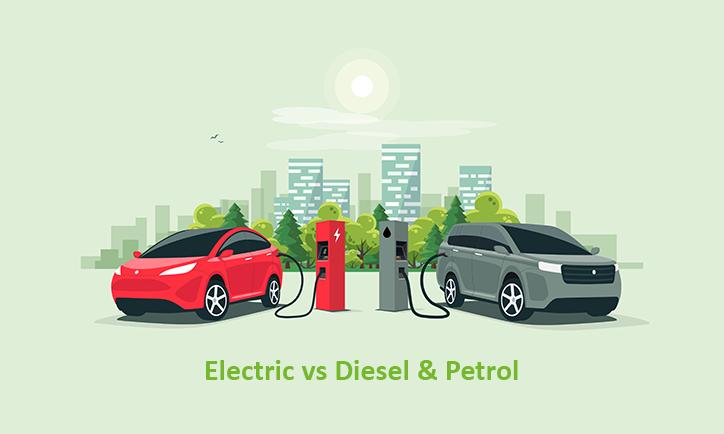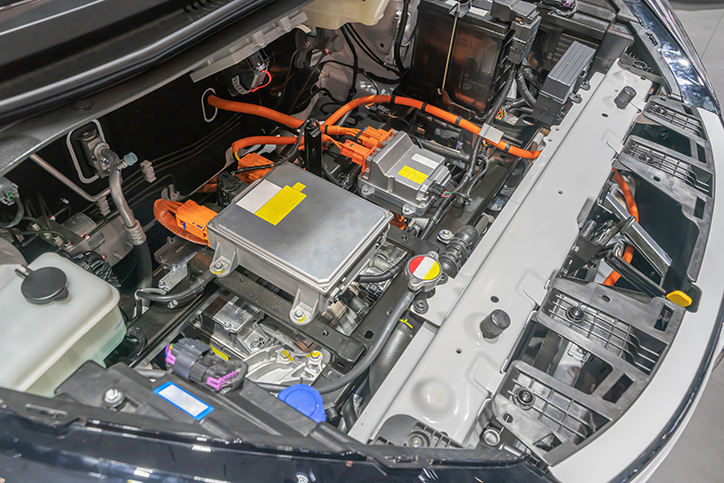Last updated: 25th September 2023
Electric and hybrid vehicles are now common sights on UK roads as sales of electric and hybrid cars and vans are increasing year on year. With increasing numbers of electric vehicles in use, the question of how to safely and responsibly recycle these relatively new types of vehicles is an ongoing challenge for our industry.
For CarTakeBack scrap car recycling centres it’s important to make sure any vehicle can be safely and responsibly recycled, and electric vehicles are no exception! Our recyclers are well versed at removing any hazardous fluids and parts from conventional petrol and diesel cars, with well-established safe systems of work and efficient processes, but what happens when an electric vehicle crosses their threshold? Electric vehicles, which run only on battery power, are mechanically simpler than their petrol or diesel counterparts, but that doesn’t mean they are easy to recycle – or even to prepare for dismantling – and hybrid electric vehicles are more complex even than petrol or diesel cars. Luckily, we have industry qualified staff on hand to make sure everything goes according to plan.

There are two main differences when recycling electric vehicles versus petrol and diesel:
1. Risks to the people who are processing the car
There are some dangers which apply to all cars, mainly due to the hazardous and flammable fluids which need to be safely removed, but for any vehicle with a battery which in some form helps towards driving the wheels, there are additional serious hazards the dismantlers need to address. These are:
The battery
Depending on the model of car, this could carry a voltage as high as 800 volts. At these sorts of voltages, any battery used to power an electric or hybrid vehicle can cause serious injury or death. In addition to the electrical risks, exposure to leaking batteries can also cause breathing difficulties and skin burns. In extreme cases, if an electric vehicle battery is mishandled it can lead to an uncontrollable fire or even explosion.
The motor
The electric motors used in electric and hybrid vehicles use incredibly powerful magnets. These are so powerful they can even interfere with medical devices such as pacemakers, and can even tear metallic objects or tools from pockets.
The electrical systems and components
In an electric or hybrid vehicle, to help keep voltages safe and suitable for delivering the right amount of power to the motor, various complex components are used. Some of these components can hold the same amount of voltage as the battery, even when the battery has been disconnected.

2. Storing, transporting and recycling of the battery
Storing the battery
Once a battery has been removed from the car, to minimise the risk of it getting damaged and potentially catching fire, injuring someone through electric shock or causing breathing difficulties through leaking chemicals, it must be very carefully handled and stored. This means any facility storing these batteries must have plenty of well-ventilated space, away from other materials such as scrap cars, fuels, tyres etc. and the batteries must not be piled on top of each other.
Transporting the battery
Because of the chemicals used inside an electric or hybrid vehicle battery, once removed from the car these must be very carefully packaged and transported to make sure there is no risk of electric shock, fire or explosion to those involved in transporting them. This sometimes involves using very expensive boxes and packaging and means that the right trucks must be used with extra safety precautions in place and properly trained drivers.
Recycling the battery
Unfortunately there are currently no facilities in the UK for recycling electric vehicle batteries. This means they must be exported to one of several facilities in mainland Europe, which involves different types of transport, lots of paperwork and a substantial cost for each battery.
What do CarTakeBack do to make sure our recycling partners are able to safely handle and recycle electric and hybrid vehicles?
Over the past few years CarTakeBack have invested in training our vehicle recycling partners in how to safely handle electric and hybrid vehicles at their end of life. This means we have enough trained recyclers to provide a safe and effective end of life battery removal service to all parts of the UK. We have agreements in place with professional logistics companies who can safely transport batteries around the UK and overseas to the recycling plants, and we have proven routes in place to make sure all electric and hybrid vehicle batteries are properly, efficiently and safely recycled at their end of life in line with the law. CarTakeBack also have colleagues who sit on several research boards to support and advise on future end of life electric and hybrid vehicle developments, including the establishment of a UK based battery recycling facility. Rest assured, when you use CarTakeBack we have got you covered, no matter what your end of life vehicle needs are.




